
RALPH WESSMAN
RECENT NEWS & EVENTS || RECENT MUSIC
VALE, Kerry Reed-Gilbert || Jan Colville || Paddy Manning and Christine Milne: 'Inside the Greens' || Island loses funding || Book prize withdrawn over pro-Palestinian activism || Australian Poetry Slam (Victorian results) || Podcast, 'Literary Friction', ft. Zadie Smith ||
Recent news & events
13 July 2019: VALE, Kerry Reed-Gilbert
"Kerry was fierce, loving, brave, passionate, whip-smart, funny and she knew better than anyone that it’s our families that sustain us" — A tribute to poet, activist, Elder & all-round legend Kerry Reed-Gilbert by Melissa Lucashenko Verity La. [Also see Australian Dictionary of Biography: Gilbert, Kevin John (1933-1993), by Alison Holland and Eleanor Williams-Gilbert (2018)].
25 July 2019: Book launch: Jan Colville's Journey, Hobart
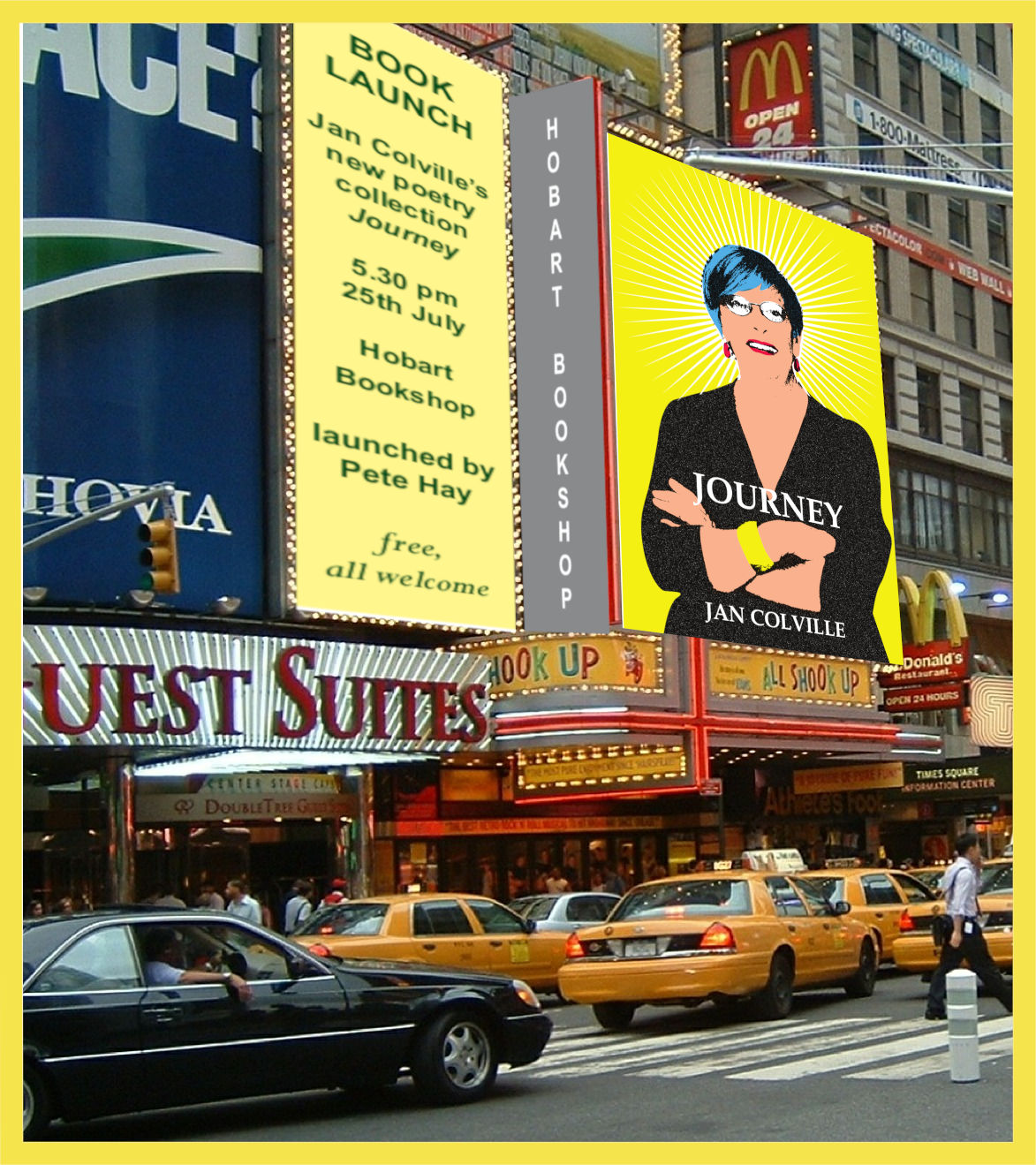
'Jan Colville invites you to accompany her on a journey - and you absolutely should!' [Pete Hay]
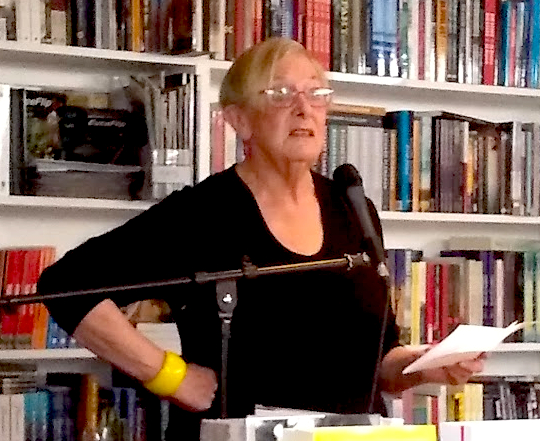
'Time as well as
place is travelled and, too, ideas are visited and crossed. Points of erudition ... moments in history ... moments of loss ... moments of affection.
In
as sense, the world has journeyed to and through Jan, and we are left with a residual wonder with what it is to be this wise, large-hearted woman who
has welcomed us into
her innermost thoughts, knowings, emotions. And above all, into her poetic sensibility.' [Pete Hay]
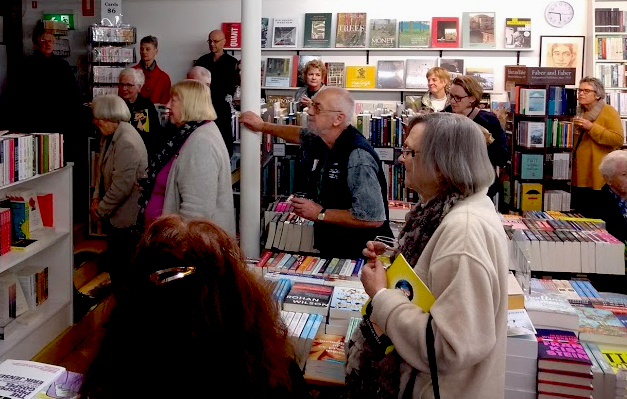
'The poem I have just read just has to be one of the finest nature poems in the language!' [Pete Hay]
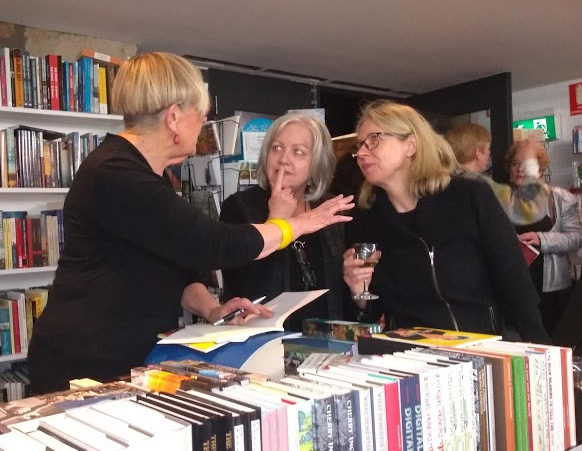
05 September 2019: Book launch: Paddy Manning's Inside The Greens
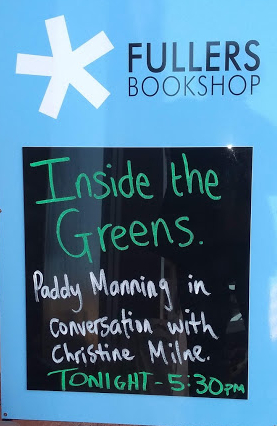 Christine Milne is seated beside Paddy Manning, the author of Inside the Greens: The Origins and Future of the Party,
the People and the Politics, (Black Inc.) She notes that it's something of a gathering of the
clans with so many Greens supporters
in attendance to hear Manning speak — and begins with a disclaimer. 'This is not an official history of
the Greens, nor was it something commissioned by the Greens. It's Paddy's take on the party and I’m really pleased that he went ahead and
wrote it because it’s disparate, complicated.... '
Christine Milne is seated beside Paddy Manning, the author of Inside the Greens: The Origins and Future of the Party,
the People and the Politics, (Black Inc.) She notes that it's something of a gathering of the
clans with so many Greens supporters
in attendance to hear Manning speak — and begins with a disclaimer. 'This is not an official history of
the Greens, nor was it something commissioned by the Greens. It's Paddy's take on the party and I’m really pleased that he went ahead and
wrote it because it’s disparate, complicated.... '
She refers to Manning's writing background, to the biographies Born to Rule, an unauthorised biography of Malcolm Turnbull, touted by
reviewer Paul Sheehan as 'a good biography. Scrupulous, fair and easy to read'; and Boganaire: The Rise and Fall of Nathan Tinkler,
the billionaire coal-mining magnate — as well as Manning's investigation into fracking in Australia, What’s Fracking? Milne's curious as to what's turned
his
attention to the Greens. 'Most of the media ignore the
us. Why did you decide to write your analysis of the role of the Greens in
Australian politics, how long has it taken and what were the complications?'
Impetus for the book arose initially from a conversation with
activist and
academic Drew Hutton, Manning explains. Hutton, back in the eighties, had been a co-founder of the
Greens. With partner Libby Connors, he'd written A History of the Australian Environment Movement (published in 1999 by Cambridge University
Press), and was a founder (and in 2011, president) of the Lock The Gate Alliance, the
grass roots movement of farmers and environmentalists concerned at the impact of risky coal mining, coal seam gas and fracking. 'It was 2012.
I was researching the coal seam gas
book and driving from the western Darling Downs back to Brisbane with Drew, having been out interviewing farmers who
were dealing with coal seam gas walls popping up on their paddocks. During the course of the three hour drive
back to Brisbane, Drew spoke to me about Lock The Gate, how for him it was about the
biggest issue he’d been involved in — "as big as the Greens".
'Then he began telling me about
the internal
struggles of the Greens, a topic I found fascinating. That really started the thought process in my mind....'
A second moment came on completion of the Turnbull biography when Manning, sitting in ABC’s Ultimo
studio one day to promote the book, bumped into Bob Brown and his partner Paul. Brown was undergoing a promotional tour for his own book, Optimism.
He broached with Brown the idea of writing a book on the Greens — Bob's response was to give him the hurry-up. 'So I thought yeah, I’d better!'
'I embarked on a proper history of the party. It's
taken me three years to write and it’s certainly been the hardest thing I’ve ever done — involving archival
research of Bob’s papers, the United Tasmania Group papers, Dick Jones' papers, and others. And it's been a wonderful experience of what
I think's a great Australian story, the birth of this party and its career through state and federal parliament.'
Milne quizzes him over her concerns with the Australian media, why it's so uncritical of the stable majority government
mantra of the two party system. 'The Greens have been around for nearly fifty years yet the Australian media still regards us as interlopers in a
two party system who should just go and join the Labor Party if we want to make things better.'
She refers to recent comments by state
Labor leader
Rebecca White, vowing Tasmanian Labor would never make the 'mistake' of working with the Greens again. (Widely reported, White's comments
accused the Greens
of not seeking consensus. “They ridicule and talk down to anyone who doesn’t agree
with their view. They leave people behind. Working people. Our people. It was a mistake to think that Labor could ever work with the Greens.
We will never make that mistake again”).
'As if we haven’t heard that since Michael Field in the 1980’s, hello deja
vu!' Milne adds.
Pete Hay's observations of a couple of decades ago come to mind.
Look at Christine Milne and Michael Field. Christine will describe herself as a Whitlam-ite. She was inspired by Whitlam, he was a hero of hers, Whitlam was the person who set her off on her own personal political track. Talk to Michael Field and you get the same conversation. Yet you come to Tasmania and find Michael Field and Christine Milne are so far apart in ideological terms that never the twain shall meet.
'So Paddy, why is this happening? Is it because of a bias in the Australian media against the Greens? Is it essentially media
ownership,
as evidenced by the
Channel 9 fund raising
that we saw this week? Is it because the Australian media cannot see beyond a two party system,
that it doesn’t actually understand proportional representation in Europe and what goes on?'
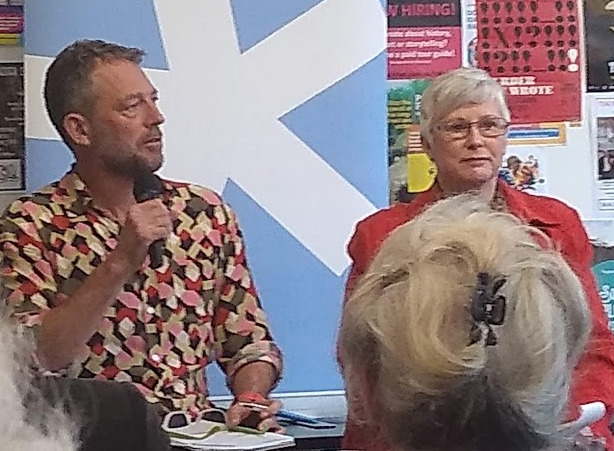 'It's a complicated answer,' Manning replies, and compares the Greens with earlier minor Australian
political parties, the DLP (Democratic Labor Party, formed 1955 following a spplit from the Labor Party), and the Australian Democrats (formed 1977).
'It’s partly a misreading of the history of minor parties since the war. When the DLP launched,
they had a very rapid rise, then peaked and fell. A similar thing
happened with the Democrats — rapid rise, then a precipitous decline. It’s a very
different projectory the Greens have travelled — a slow build. Although their vote peaked nationally in 2010, it hasn't declined – it’s plateaued.
'It's a complicated answer,' Manning replies, and compares the Greens with earlier minor Australian
political parties, the DLP (Democratic Labor Party, formed 1955 following a spplit from the Labor Party), and the Australian Democrats (formed 1977).
'It’s partly a misreading of the history of minor parties since the war. When the DLP launched,
they had a very rapid rise, then peaked and fell. A similar thing
happened with the Democrats — rapid rise, then a precipitous decline. It’s a very
different projectory the Greens have travelled — a slow build. Although their vote peaked nationally in 2010, it hasn't declined – it’s plateaued.
'I think there’s a tendency for the press gallery to assume that,
like the DLP or the Democrats, the Greens are going to fade away. You hear it every
time there’s a major legislative decision or compromise, "this is the Greens’ Democrat moment, they’re
about to collapse". Firstly, the Democrats didn’t collapse. The Democrats went through a series of body blows — the GST,
Kernow’s defection, the tearing down of Natasha Stott–Despoja — it took years to kill the Democrats. And the Greens are much more successful
in terms of their presence in federal, state and local governments than the Democrats ever were. Both Upper and Lower Houses,
and councils. The Greens are a more formidable political party than any other in post-war Australian political history.'
'Then there’s the question about biases'. In Manning's view, many journalists are closet Greens. 'Though I’ve no evidence for it,' he adds.
'And I think
there’s a logical reason for this, it allows you to go hard at both major parties in your political coverage because you haven’t a
stake in either. But I suspect what happens is that a lot of journalists over-correct. Self-censor. They’re harder on
the Greens even though that may well be the party they vote for.'
'Yes; and it frustrates us year in, year out — decades in, decades out,' Milne responds heatedly.
* * *
Christine mentions the book's joint dedications, to Milo Dunphy and Jack Mundey. 'That’s an interesting combination, dedicated to the people there at the start.' She notes other important figures of the time — Judith Wright, Geoff Moseley, Vincent Serventy — before returning her attention to Mundey, the Sydney trade unionist elected secretary of the NSW Builders' Labourers Federation in 1968 and responsible for the Green Bans protecting inner Sydney heritage sites. 'Jack Mundey represented a shift in trade unionism by saying you could speak for the greater good at the same as you were speaking for the immediate concerns of the union. That’s something that unionism has tended to lose in recent years, but at that time they had the big picture. It was at the time that Jack Mundey adopted the term "Green Ban" relating, in Sydney, to the Rocks area, bringing together conservationists and unionists protecting the area, and it's where Petra Kelly got the name for the German Greens.'
* * *
Milne's curious as to Manning's view on
the emergence of the United Tasmania Group, formed in response to the decision by
the Hydro and the Tasmanian government of the day to flood Lake Pedder. 'Paddy, you say that moment has a singular place within
the history of the Greens so I wanted to ask you, what do you see as the role of the Pedder campaign and the Tasmanian
Greens in shaping the philosophical view and the modus operandi of the Australian Greens as a national party?'
Manning says perhaps the most profound thing he's read on the issue has been one of Richard Flanagan's essays in the book Flanagan edited
with Cassandra Pybus, The Rest of the world is watching. 'The point Richard makes is that in Tasmania, Labor — the establishment party —
had been in power
for thirty-five years, and the formation of the United Tasmania Group — because no party
was in favour of conservation of Lake Pedder — stamped on the Tasmanian party, not so much a hatred of Labor but a deep conviction
that Labor was not the answer. It was a rejection of
both parties, not just a decision that we will try and force Labor to be better, but a decision that Labor was not the way
forward, was not the solution and there had to be an entirely new party created. I dedicated the book to Milo because he played a very
important role in setting up the United Tasmania Group back in 1971, coming down and campaigning against
the flooding of Lake Pedder.
'The interesting thing about putting the firebrand communist unionist Jack
Mundey together with the true green, slightly conservative Milo Dunphy is to show that the tension between the hard left,
and your greens — your red-greens, your green-greens — has been there right from the very beginning. Both were
councillors on the Australian Conservation Foundation, but ended up being political rivals. That debate continues
inside the Greens today.'
Milne agrees. 'Yes, the UTG was a great moment of possibility of bringing together people from all walks of life and from all different political and
philosophical backgrounds to work on an environmental campaign. Interestingly, at the time of the UTG’s first vote, the core support
was much more heavily in the south than in the
north and in rural Tasmania. Pete Hay, our highly respected historian and political analyst, said at the time that "if green values have
little attraction to either the conspicuously affluent, or the traditional working class, the section of the community amenable to
conversion would seem to be fairly small". But when you think of the climate emergency getting worse, the Murray-Darling scandal, in spite of the
efforts the Greens have made in public housing,
public transport, public education, public health and Rachel Siewert’s tenacious campaign with the Australian Greens to get an increase in
Newstart — fifty years later we’re still
in the same position where we’re getting less than twenty percent of the vote. It goes back to Pete Hay’s position about the conspicuously
affluent and the traditional working class not voting Green then, and — largely — still not voting Green now. Why you think that is?
I'll also put to you Drew Hutton’s view, that the Greens
need a Bogan Revolution! Why aren’t we breaking through?'
'The media coverage of the party makes it harder,' Manning replies. 'But the best answer I heard to that question was that if you look
at the Greens’ vote in the suburbs, it's going
up. It’s just taking a long time, it’s not going to happen overnight.
I’m not convinced it's a ceiling permanently set that will stop the Greens at ten percent for ever. The Greens’ vote peaked nationally at —
what? — fifteen percent in 2010? In Germany right now, the Greens' primary vote is the highest vote of any party in the recent
European elections, so there’s certainly no ten percent ceiling there.
'Turning to Drew's idea of the Bogan Revolution, that you need to be able to get ordinary people turning up to a Greens’ party meeting —
not only innercity,
university-educated hipsters but ordinary people — well, they’re free and welcome to turn up to a meeting with inconvenient views.
I canvas the idea of Green battlers in the book, only because it’s so incongruous. You talk about a Green battler and you
think, "I’ve never met one of those!" But why? Why is that?'
Milne agrees there are a lot of green battlers in the bush. 'But they vote National!' She believes
rural people losing services, facing crises with water and climate, would be better off voting Green. 'Yet they vote for
people who don’t support them. That’s our reality.'
'One of the challenges Paddy identifies in the book,' Milne continues, 'is that the environment’s always been the absolute essential
pillar for the
Greens — alongside, of course, social
justice, participatory democracy, peace and non-violence — but the environment is absolutely at the heart of it. And yet we
now have what I would describe as "entrism"'. The depth of feeling is evident, because at the heart of Milne's 'entrism' is division.
'People are entering the party with a view to abandoning
environment as the central tenet of the Greens'. For Milne, one of the key issues facing the Greens is how to unite both arms — the members focussed on
social justice, and those on 'green' environmental issues — of the party.
* * *
Refocussing his attention from the future to the past, Manning suggests the Greens’ best legacy – state and federal – has been to try and clean
up politics. 'On improving the
workings of our parliament, on donations law reform, on freedom of information, on anti-corruption agencies, on electoral
reform, on a parliamentary budget office, on a whole range of things
like the federal ICAC — which will come — and have been argued most strongly by the Greens consistently for years. That’s a great legacy for a party, just by
itself. I think a majority of Australians want to see politics cleaned up and corruption and dirty money out of politics.'
Milne holds high a copy of Manning's book.
'On the back cover you ask "Will a refusal to compromise be a stumbling block for the Greens in the
future?" Now that’s reminiscent of Labor’s harping on that the Greens always make "the perfect the enemy of the good", that the
Greens won’t compromise: but it’s just not true. The Greens have compromised endlessly over time to get outcomes, and we can give
you any number of examples of that.
'But the Greens have bottom lines. We'll compromise, but we will compromise to a point and
then we will say, no, that infringes international law, or that just can’t be done. Surely that
is a position of policy integrity and political integrity ... yet we get criticised for it, because we’re not "pragmatic enough"
in order to sell everything out, in order to get a deal, in order to get an outcome. Why do people perpetuate the notion that the Greens won't compromise,
and to what extent in your book do you acknowledge the compromises we've made over the years?'
'We’ve accounts from Rudd, Gillard, Combet,
and Swan of the decision made in 2009 to vote against the emissions trading scheme,' Manning replies, 'which is where the idea of the "perfect being
the enemy of the good" really becomes crystalised. I think there are still a lot of people – Green voters and most particularly,
non-Green voters – who hold that against the Greens.
'I don’t have a verdict on whether that was the right
or the wrong thing to do,' Manning continues. 'What I do think is that there should be room in Australian politics for a party that argues a position
that is consistent with the climate science. How hard is it? If Labor won’t do that, then a party will be created to do that because
it’s an existential crisis and somebody needs to make the argument.
'I’ve come to the same position on Adani. Should the Greens
compromise on Adani? Well I’m sorry — and I think a majority of Australians take this view — I don’t want that mine to go ahead. If there’s no party —
even if the Greens collapsed tomorrow — I think Adani itself would justify the formation of a brand new
political party called The Stop Adani Party, because most Australians don’t want that mine to go ahead. It’s just like the Franklin, just like Pedder,
just like Jabiluka – there’s a large weight of opinion there, and I think there’s room for a party that is
uncompromising. I think labor needs to get real about the platform that the Greens have developed — let’s face it:
half the Labor Party would like to have those positions themselves. The reason the
Greens are such a threat to Labor is because if they take Labor’s left wing, Labor will be the poorer for it. Certainly, on Labor’s
left, they don’t want to see the Greens swallow up their entire constituency. Labor seems to be
learning the wrong lessons from this election defeat and leaving more room for the Greens — going back towards coal, going back
towards tax cuts that favour the rich.... I think this is part of the reason why there may well be some upside for the Greens from
where they are now.'
Christine Milne points out that since the election, Richard Marles —
the new deputy leader of Labor — has apologised to the coal industry in Queensland for not being more supportive, not only supporting
Adani but the expansion of coal seam gas. 'And of course on refugees, it’s extremely difficult to stomach the hypocrisy of the last
week with Labor so strongly supporting the Sri Lankan family — and I think it’s good that they have – but: who opened Manus
and Nauru? And who is not talking about the rest of the people stuck on Manus and Nauru? It’s not just Sri Lankan families, it's a policy
position. But this goes back to the perfect being the enemy of the good. It's as if people fail to recognise
that there is international law. The Greens have always made a point of saying, we will adhere to international law, that has to be
a bottom line — otherwise, if you’re going to go across that, where does that end?
* * *
'We’re just about to run out of time Paddy, but I wanted to read your conclusion to the book, which is a real compliment to the Greens,
‘By dint of idealism rather than opportunism, and hard work not money, the Greens have carried their place in parliaments and councils across Australia and love them or hate them, the country’s democracy is healthier for it’.
'I wonder, what is your overall prediction for the Greens for the future? Where do you think things are going to go in the next few years
for us?
'I’ll just speak to the hate bit (love 'em or hate them) there,' Manning replies, 'because I think the Greens have cultural problems that have absolutely crippled
the party in the two largest branches, in NSW and Victoria.'
He's referring to controversies in NSW (in one instance,
an upper house preselection ballot), and in Victoria where former
Greens Alex Bhathal quit the party over
'organisational bullying'. Manning mentions the latter fracas in his book.
On a blunt assessment, Bhathal was a high-profile victim of a long-running feud between two Melbourne branches, the Darebin and Moreland Greens. Hardly anyone knows whence it started, or what it’s about.
'So when I say love ’em or hate them, I mean it,' he continues. 'I spent so much
time reading toxic facebook posts of people attacking each other that it’s
a lifetime overdose for me. I think the Greens have problems in all states — NSW gets picked on, and NSW has been through an
atrocious last twelve to eighteen months. But so has Victoria.
'I think there’s a real threshold issue for the Greens to
address, there is so much being spilled. It's partly a disruptive political cycle — and social media —
creating a culture that’s not very healthy at the best of times, inside or outside the Greens. Also, I think the Greens have a
consensus-based decision–making process that is no longer working. It aspires to achieve a consensus which is impossible to deal with when you’ve
deeply entrenched factions, yet the system won’t allow you to recognise those factions.
'As part
of its maturity, I think the party needs to recognise that those differences, whether they’re person-, or policy-based; perhaps through an approach
like the German Greens
with their fundamentalist and pragmatic wings. I don’t have the answers. But I think the Greens will be crippled if
they can’t address that internal
cultural problem. People will turn off — or they’ll just never join in the first place.
'Yet what we saw in the recent federal election was that despite twelve
to eighteen months of disastrous infighting in the two biggest states, the Greens held the line. They had to defend, they couldn’t
go forward: in terms of representation in the senate, they had to defend a senator in each state — and they got re-elected, every
single one of them.
'And there are good reasons why those senators were re-elected. Certainly, if the Greens get the same vote in the 2022 election, they’re looking at eleven or twelve senators and, potentially, at
the balance of power in the senate in their own right. And then it won’t matter how many
times Labor says never ever ever ever ever.... There is an argument that if the Greens can fix their internal cultural problems and stop fighting
each other, that they might actually be able to take a leap forward at the next federal election.'
Christine Milne agrees internal challenges face the Greens. 'I always said when I was leader, you’ve energy to fight everyone out the front if the people behind you are with you. If however you’re trying to fight
everyone out the front and you’re not supported or there’s a big internal brawl behind you, it is just exhausting and it takes
away from your capacity to be effective.
'But like Paddy, I think the future is very "green" for us.'
Audience question
I want to go back to the 'winner takes all, you've got to have a majority government' question. We don't seem to be able to be sophisticated enough in this state — or in Australia — to embrace the European situation where no party gets a majority and it's actually a good idea to negotiate with each other, come out with accommodations and work from that. Can we ever move past that in Australia? What happens if and when the Greens vote actually improves, what does that mean for political outcomes? Does it leave the Greens always as the party that can moderate the worst of what some other party was about to do, and 'occasionally' get something up, but never implement their own agenda? Will there be situations where the Greens can get more of their platform up by being able to have this sort of sophisticated negotiation and attitude? Or is it not just the big parties but the media who are actually going to prevent that happening? And does that mean that the Greens need to actually try and work to become a major party, and take government in their own right? We never talk about that. Every time we get near to increasing our vote we think we're going to go into the balance of power. What if we didn't? What if we tried to go that next step ... is that even feasible?
The question of the Greens governing in their own right has perhaps been addressed, in Manning's mind at least, by his reference to
solving the Greens' internal problems as a prelude to the next 'leap forward'. His reply focusses firmly
on the possibility of a Labor / Greens coalition.
'I think in Tassie and the ACT — and federally during the Gillard years — you've examples of effective coalitions being formed between
Labor and the Greens. Even, for a short period of time, a de facto relationship with the Liberals in the Rundle era. Basically, I hope there's a
possibility Labor and the Greens could come to terms. And I'm not the only commentator suggesting this, Greg Jericho in The Guardian
was saying, after the election,
Labor and the Greens need to work together.'
Manning contemplates the prospect of an Albanese-led Labor Party taking the party back towards the right, perhaps resulting in a stronger Greens
representation in
parliament, thus presenting a greater likelihood of Labor and the Greens cutting a deal together. He says he's all in favour of a politics offering compromise,
but adds realistically, 'When you actually start talking to people about proportional representation most people's eyes glaze over.
Constitutional reform in
Australia is so hard that it feels like a pipe dream to talk about it. But gradually voters, by continually lowering that share of the
vote going to the major parties, will force coalitions onto the federal parliament. That trend has not changed — it's been going on for decades,
and it's a trend for which there's no sign of a reversal.'
06 September 2019: Island loses Arts Tasmania support
'On Friday 6 September, as we prepared to send the 158th issue of Island magazine to the
printer, we learned of our failure to win a renewal of our four-year funding arrangement with Arts Tasmania. Until now, that support
has underpinned the magazine’s financial viability.' ... [Island]
See also Ben
Walter's response
On the defunding of Island magazine — and what it will mean for Tasmanian writers, published in Overland.
23 September 2019: Book prize withdrawn over novelist's pro-Palestinian activism
Israeli-Palestinian
political debate has been fuelled by the decision to revoke the Nelly Sachs prize awarded to UK author Kamila Shamsie, over her support for
boycotting Israel.
The Times of Israel (24th
September 2019)
reports that more than 250 writers have come to the defense of British author Kamila Shamsie. 'They signed an
open letter published on Monday in the London Review of Books that said that the Nelly Sachs prize has chosen to "punish an author for her human
rights advocacy."'
Alison Flood writes more on the issue in her article in The Guardian dated
23 September, 2019. (Those defending Shamsie include Arundhati Roy, JM Coetzee, Sally Rooney, Noam Chomsky, Amit Chaudhuri, William Dalrymple,
Yann Martel, Jeanette Winterson and Ben Okri).
Also read 2010 Man Booker prize-winning author
Howard Jacobson's
rebuttal (Tablet, Oct 2, 2019), supporting the jury's decision.
04 October 2019: 2019 Australian Poetry Slam
Victorian winner: Zaynab Farah. Victorian runner-up: wāni
07 October 2019: 'Literary Friction' podcast, featuring Zadie Smith
The 7th October episode of 'Literary Friction', (a conversation about books and ideas,
hosted by friends Carrie Plitt and Octavia Bright), features Octavia in thoughtful conversation with British author Zadie Smith.
Apparent from the exchange is Smith's acknowledgement of personal strengths and weaknesses, coupled with a capacity to safely arrive at a personal
place of comfort. 'Some people are
perhaps much better at intimacy,' Smith suggests. (Does she speak personally, or comparatively?)
'For me, knowing people has happened a lot at a remove, knowing them through their books. And certainly as a professional writer, though I am a huge fan of writers, I almost never (apart from writers who are close friends)....' She hesitates, pushes on. 'Once I've read the book, I feel I have the best of that person. Nothing is added for me by going to meet them (laughter....) To me, what I love is in the book. So I'm always aware of being a disappointment retrospectively to the people who meet me — cos I know that feeling, the book is the thing where this incredible intimacy happens.'
(Much the same sentiment is revealed within O.A. Scott's reflective feature on writer Susan Sontag, published recently in The New York Times. Recalling Sontag's visit to meet Thomas Mann, living at the time in California in exile from Nazi Germany, Scott notes 'the disappointment Susan tries to fight off in the presence of a literary idol who talks "like a book review".... Sontag's response? '"Why would I want to meet him?" she wondered. "I had his books."')
* * *
Smith articulates her views on cultural appropriation...
('I come from a place of ventriloquism ... a family of actors and comedians, people whose job it is to be not themselves'); on adopting differing personas,
(the girl traipsing the street, wearing earphones, listening to hip hop — 'And for that moment she's not quite the girl walking down the street,
she's the guy singing the song, or she's in a different country, in a different mindset. I think these slippages happen all the time!'); on dialecticism ('The story ... basically it's about the idea that lots of people, including myself, are always aware — every day —
that the mass murder of animals is a moral nightmare. It's like a daily holocaust! And yet — I eat meat! I was interested in
that: how does that work, that dialectic in your mind? Like, you know the truth and you know its opposite — and you
synthesize it. The Hegelian idea is that you synthesize it in this further truth — but it seems to me in our daily lives we synthesize it
in self-deception!'), and more.
Well worth a listen.
11 October 2019: Sydney University shelves funding for chair of Australian literature
Recent music: an eclectic mix
11 January 2019: Mereani Masani and Emily Wurramara, 'No Moa (No More)'
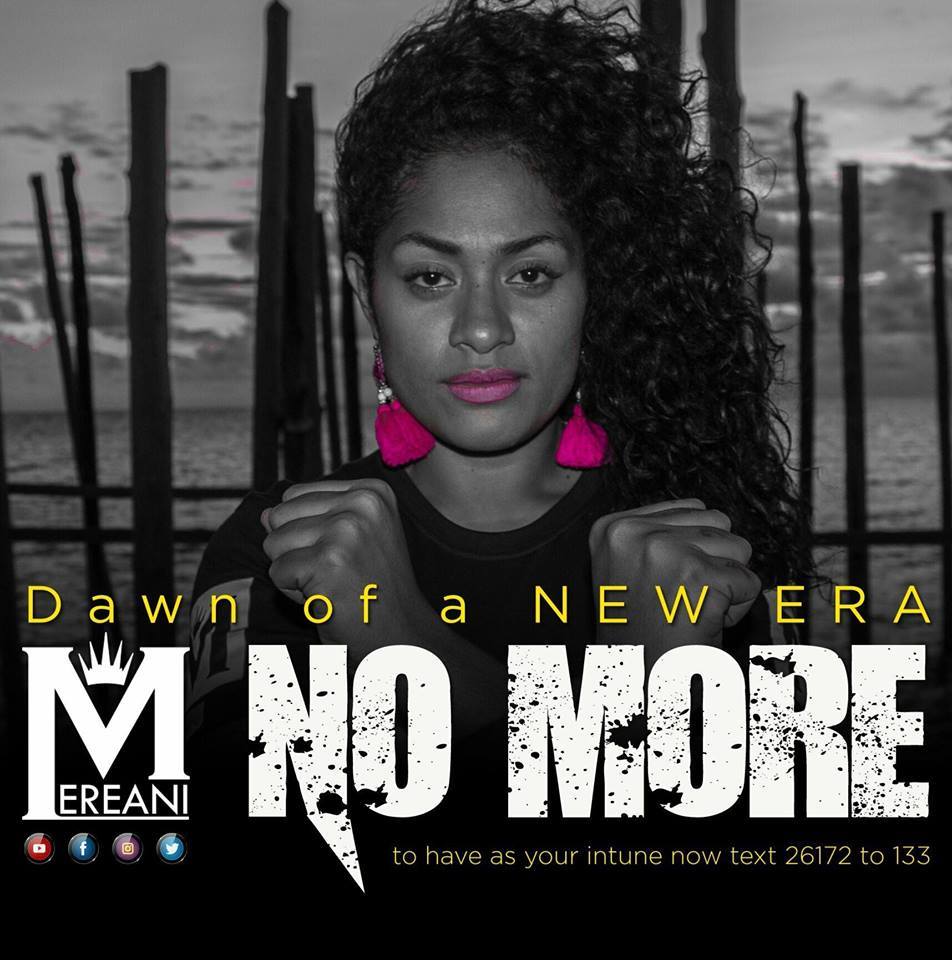 Papua New Guinean artist Mereani Masani accompanied Australian musician Emily Wurramara earlier in the year in a re-working of a Mereani song, ‘No Moa’.
The re-mixed version includes new lyrics by Wurramara reflecting the 2018 NAIDOC Week theme — 'Because of Her We Can!' — with a powerful
call to action to end violence against women.
Papua New Guinean artist Mereani Masani accompanied Australian musician Emily Wurramara earlier in the year in a re-working of a Mereani song, ‘No Moa’.
The re-mixed version includes new lyrics by Wurramara reflecting the 2018 NAIDOC Week theme — 'Because of Her We Can!' — with a powerful
call to action to end violence against women.
17 January 2019: Tiny Ruins, 'Holograms'
Auckland band Tiny Ruins has been performing since 2011, with ‘Holograms’ the fourth release from their most recent album ‘Olympic Girls’. To understand why the band's been so critically successful throughout its career, visit their website, and have a listen to earlier work such as Me at the Museum, You in the Winter Garden and Carriages from their 2014 album ‘Brightly Painted One’. There's also fine footage online of the band performing at Auckland's Crystal Palace in 2014.
28 January 2019: Julia Jacklin 'Don't Know How to Keep Loving You'
A single from Australian musician Julia Jacklin's second album, 'Crushing' — released in February 2019 ... visit Marcy Donelson's review of the album at AllMusic.
28 February 2019: Tones and I, 'Johnny Run Away'
'Johnny Run Away' is the first single from the 2019 EP 'The Kids Are Coming' by Australian singer-songwriter Toni Watson. Watson, known professionally as 'Tones and I', is based in Byron Bay.
05 March 2019: Tim Baker, 'Dance'
From 2005 to 2017, Newfoundland singer/songwriter Tim Baker performed with seven-piece indie rock band Oh Rosetta! The compellingly choreographed track 'Dance' is from Baker's recent album 'Forever Overhead', other tracks include 'Spirit' and 'All Hands'. He has a web presence at Tim Baker.
12 March 2019: Còig, 'From the Old Tapes'
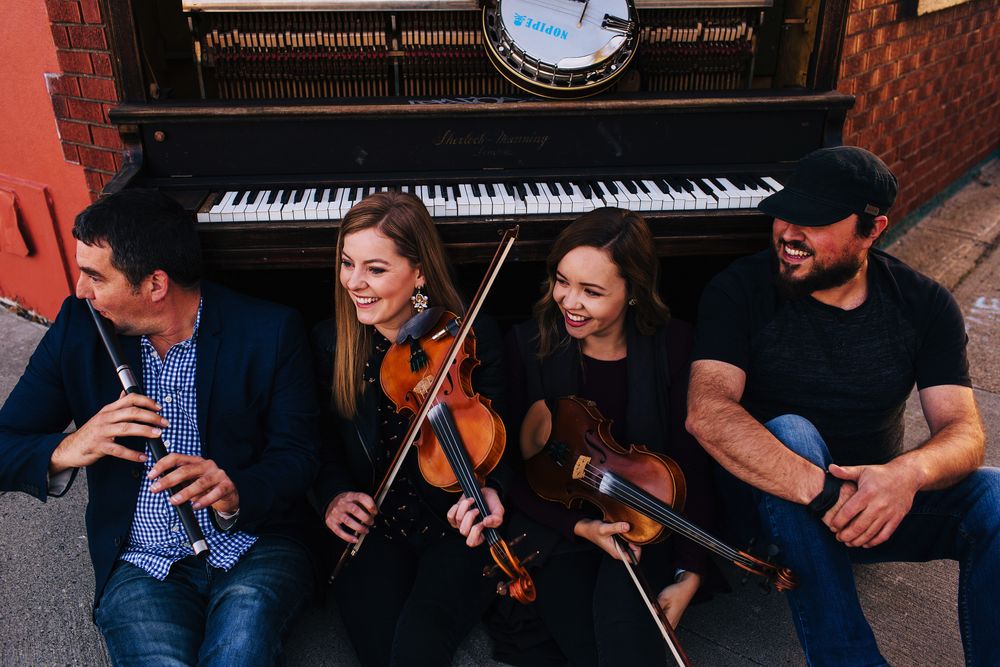 Còig is a four-piece band from Cape Breton, Canada, with 'From the Old Tapes' — starts slow, finishes fast — taken from their 2019 album 'Ashlar'.
With a nod to the deep roots that inspired all the members to start playing Celtic music in the first place,
piano player Jason Roach and fiddler Chrissy Crowley put together “From The Old Tapes,” a set of Cape Breton classics from the likes of Winston “Scotty”
Fitzgerald, John Morris Rankin and Brenda Stubbert. The reels and strathspeys were gleaned from rare homemade recordings in kitchens and
dances, copied and passed around for decades.
Còig is a four-piece band from Cape Breton, Canada, with 'From the Old Tapes' — starts slow, finishes fast — taken from their 2019 album 'Ashlar'.
With a nod to the deep roots that inspired all the members to start playing Celtic music in the first place,
piano player Jason Roach and fiddler Chrissy Crowley put together “From The Old Tapes,” a set of Cape Breton classics from the likes of Winston “Scotty”
Fitzgerald, John Morris Rankin and Brenda Stubbert. The reels and strathspeys were gleaned from rare homemade recordings in kitchens and
dances, copied and passed around for decades.
13 March 2019: Villages, 'Maggie of the Cove'
Villages are a folk group from Cape Breton, Nova Scotia, now based in Halifax. 'Maggie of the Cove' is from
their self-titled debut album.
'The members of Villages originally assembled as indie rock band Mardeen, but when new songs started going in a more acoustic and atmospheric direction,
they created a new entity to better suit their fresh approach to Maritime folk.'
(The Chronicle Herald, 11th April 2019.)
18 April 2019: Iris DeMent 'We Won't Keep Quiet'
Iris DeMent's tribute to MILCK's 'ICantKeepQuiet' campaign and anthem of the 2017 Women's March on Washington. [Also: MILCK's official video of 'I Can't Keep Quiet.]
19 April 2019: Santana 'Breaking down the door', ft Buika
From a new album — 'Africa Speaks' — by Santana along with his eight-piece band, featuring vocals by Afro-Latin singer Buika.
05 May 2019: Farhad Bandesh 'Free Emotion'
Melody guitar solo by Kurdish visual artist, musician and instrument maker Farhad Bandesh — Manus Island, Papua New Guinea.
17 May 2019: Linda May Han Oh, 'Kirigami'
'Kirigami' is from a new recording ('Aventurine') by Australian performer (acoustic and electric bass) Linda My Han Oh, also featuring Greg Ward: alto and soprano saxophones; Matt Mitchell: piano; Ches Smith: drums, vibraphone; Fung Chern Hwei: violin; Sara Caswell: violin; Bennie Von Gutzeit: viola; Jeremy Harman: cello + Invenio vocal ensemble.
21 May 2019: Russian Circles, 'Arluck'
Chicago's Russian Circles (three piece instrumental band formed in 2004) have released the single 'Arluck' from their studio album 'Blood Year'.
06 June 2019: Polyphony Choir, 'Nick Cave medley'
Polyphony is a Sydney choir; their 'Nick Cave medley' was filmed at a recent performance. Journalist and choir member Stephanie Convery describes her involvement with the choir in a recent article How I fell back in love with singing in The Guardian:
'Singing in a choir taught me that music is best when it’s shared, but singing with Polyphony taught me how important it is to make time for pure joy. We are a community choir: we are political staffers, artists, school teachers, computer programmers, personal assistants, events managers, administrators, students, and therapists; we have all kinds of cultural backgrounds and personal lives.... The only thing we all have in common is that we sing together, yet it is enough.'
01 July 2019: Mandolin Orange Concert: 'Music at the Mansion'
01 July 2019: JóiPé X Króli, 'Tveir Koddar'
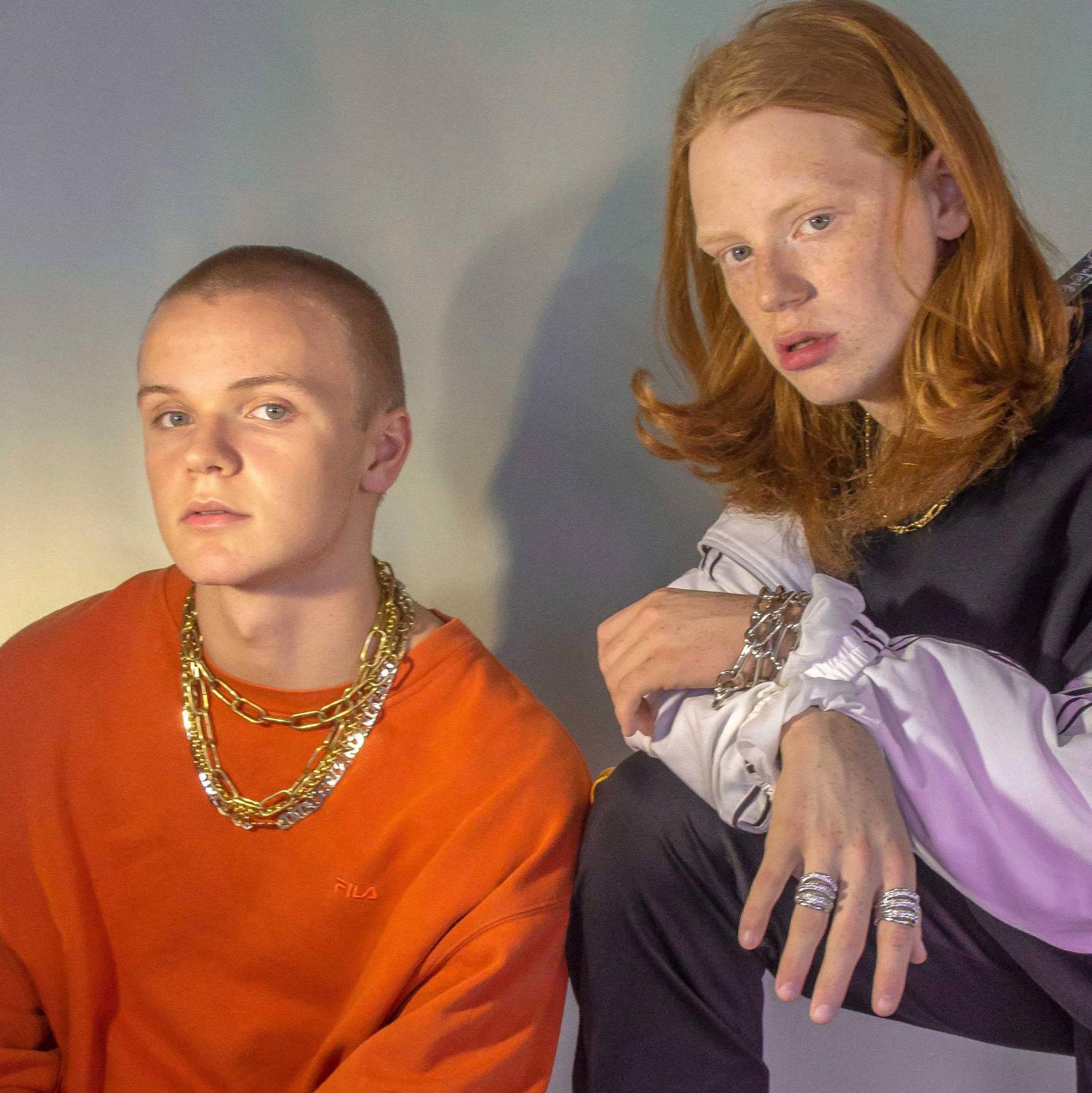 'The rap in Iceland is the king,'
writes Jordi Pujolá,
'especially the Icelandic rap.'
'The rap in Iceland is the king,'
writes Jordi Pujolá,
'especially the Icelandic rap.'
'Tveir Koddar' is the latest single from Icelandic hip-hop duo JóiPé and Króli, following on from earlier work
including their energetic 2017 single B.O.B.A.
03 July 2019: The DK Effect, 'Magic Carpet Ride'
The DK Effect is a Tasmanian band who play original soul, funk and gospel-infused rhythm and blues.
The group consists of powerful vocal trinity (Crystal Campbell, Ruby Austin-Lund and Jamie Taylor),
Randal Muir (keys), Aleks Folvig (guitar and vocals), Al Tolond (drums), David Johnstone (bass) and Jed Adams (sax), with Campbell,
Austin-Lund and Taylor running through a quick rendition of 'Magic Carpet Ride' in this video.
An five track EP — recorded in Hobart between October 2018 and January 2019 — is forthcoming, details
The DK Effect: EP
11 July 2019: Strung Out, 'Under The Western Sky'
Strung Out is an American punk rock band formed in 1990, their music combining melodic punk rock, progressive rock and heavy metal.
12 July 2019: Gaby Moreno & Van Dyke Parks (with Jackson Browne) 'Across the Borderline'
Gaby Moreno and Van Dyke Parks perform "Across the Borderline" (by Ry Cooder, John Hiatt, and Jim Dickinson) with Jackson Browne, from the new album '¡Spangled!'
20 July 2019: Courtney Barnett Rock The Garden, 2019, Minneapolis: Full concert
Twelve songs by Australian artist Courtney Barnett recorded live in June 2019 at Rock the Garden Festival, Minneapolis.
22 July 2019: Black Pumas 'Colors'
'Black Pumas are the answer to the exciting question of what it would sound like if Sam Cooke or Neil Young joined the Wu-Tang Clan.' The Guardian, 8th June 2019.
26 July 2019: The East Pointers, 'Wintergreen'
The single ‘Wintergreen’ by Prince Edward Island-based Canadian trio The East Pointers is from the band's third album 'Yours To Break', out October 25th, 2019. The East Pointers — redefining the ever-evolving genre, modern folk — are Tim Chaisson (vocals, fiddle, percussion), Koady Chaisson (banjo, tenor guitar, moog) and Jake Charron (guitar, keyboards). In addition to their own songwriting and touring, The East Pointers run the Rollo Bay Fiddle Festival on Prince Edward Island, originally founded by Tim and Koady’s grandfather in 1976.
31 July 2019: Mambali, featuring Emily Wurramara, 'Yuwani'
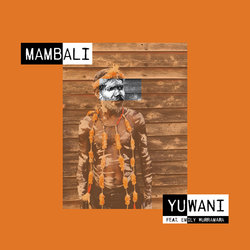 Mambali are from Numbulwar in the Gulf Of Carpentaria, Queensland, forming late in 2008. Fusing their traditional cultural songs and rhythms
with contemporary sounds and beats, Mambali create a pulsating performance about country, culture and the Dhumbul Dance (Devil Dance).
Mambali are from Numbulwar in the Gulf Of Carpentaria, Queensland, forming late in 2008. Fusing their traditional cultural songs and rhythms
with contemporary sounds and beats, Mambali create a pulsating performance about country, culture and the Dhumbul Dance (Devil Dance).
Mambali partnered with Groote Eylandt, now Brisbane-based, singer-songwriter Emily Wurramara to create their new single Yuwani; a modern
take on a traditional song.
02 August 2019: Possible Humans, 'Lung of the City'
'Lung of the City' is taken from the Melbourne band's debut album "Everybody Split", released by Trouble In Mind Records on August 2nd, 2019. Possible Humans formed in 2012 as a loose amalgamation of solo projects, initially a foursome — Leon Cranswick and Hewitt brothers Steve, Mark and Adam — and joined later by Samuel Tapper. Instrument-swapping was rife in the early days (of the band) but now Mark usually drums, Sam and Steve do most of the singing, and Adam and Leon do everything. Influences have probably always included Guided By Voices, Neil Young and Wire.
03 August 2019: Rosier, 'Vie Pénible'
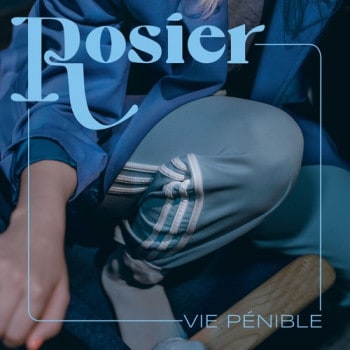 Rosier is a Canadian bilingual indie folk
band of five Québeq musicians who've been together for over ten years and formerly performed as
Les Poules à Colin. The band's busy schedule throughout August to October 2019 includes appearances at the Newfoundland and Labrador Folk Festival
, the Danish Folk Music Festival,Tønder, Denmark, Towersey
Festival, Thame, England, Head Out, Not Home - Norwich, England, Festival Noctambullerie, Saint Aignan, France,
Fête de la Mer, Le Havre, France, Bromyard Folk Festival, England, Hudson West Folk Festival, Jersey City, USA, Wakefield, Rhode Island,
USA and Charlottesville, Virginia, USA. 'Vie Pénible' is the first single
from their new self-titled EP.
Rosier is a Canadian bilingual indie folk
band of five Québeq musicians who've been together for over ten years and formerly performed as
Les Poules à Colin. The band's busy schedule throughout August to October 2019 includes appearances at the Newfoundland and Labrador Folk Festival
, the Danish Folk Music Festival,Tønder, Denmark, Towersey
Festival, Thame, England, Head Out, Not Home - Norwich, England, Festival Noctambullerie, Saint Aignan, France,
Fête de la Mer, Le Havre, France, Bromyard Folk Festival, England, Hudson West Folk Festival, Jersey City, USA, Wakefield, Rhode Island,
USA and Charlottesville, Virginia, USA. 'Vie Pénible' is the first single
from their new self-titled EP.
12 August 2019: iLe NPR Music Tiny Desk Concert
When vocalist Ileana Cabra Joglar and her band visited the Tiny Desk, they'd just arrived from the front lines of the historic demonstrations taking place in Puerto Rico.... She and the band transformed the passion and revolutionary spirit of the massive street demonstrations into a performance unlike many heard....
13 August 2019: Big Thief 'Not'
'Not' is the first single released from Big Thief's October 2019 album 'Big Hands'; there's a version online as well of the song
performed live at Flow Festival, Helsinki in August. Also deserving attention is their
NPR Music Tiny Desk Concert, recorded in September 2016. Big Thief is a Brooklyn-based indie band – lead singer
and guitarist Adrianne Lenker, guitarist Buck Meek, bassist Max Oleartchik and drummer James Krivchenia.
The Independent, (01 May 2019)
features an
interview with Adrianne Lecker looking more closely at the band's music:
Introspective and softly spoken, Lenker seems to see the wonder in everything: love, death, birth, trauma, wounds, a sunset, “the way that a raspberry can pop out of the earth”. It’s a trait in keeping with her band’s music — heady folk-rock that is unflinchingly sincere.
14 August 2019: Spacey Jane 'Good For You'
West Australian band 'Spacey Jane' (rock, indie, garage pop) have been performing together since 2016. 'Good For You' is their latest single.
20 August 2019: Tinariwen 'Kel Tinawen'
The band Tinariwen, formed in 1972, is comprised of Tuareg musicians from northern Mali. The track 'Kel Tinawen' is from the September 2019 album 'Amadjar'.
21 August 2019: Brittany Howard 'Stay High'
From the debut solo album “Jaime” (September 20, 2019). A video of her Concert in St Paul, Minnesota (19th Sept 2019) promotes the album, while Stephen Thomas Erlewine's review of 'Jaime' is online at AllMusic.
6th September 2019: Delacey 'The Subway Song'
Delacey (26-year-old Brittany Amaradio) is a singer-songwriter based in Los Angeles. She’s co-written songs for The Chainsmokers “New York City”, Halsey “Without Me”, Madison Beer “Dead’, and Zara Larsson “Ruin My Life”, among others.
18 September 2019: Hiromi Uehara 'Spectrum' (live)
Jazz pianist Hiromi Uehara 'issued (the album) Spectrum on the eve of her fortieth birthday as an overview of what she learned as a musician in her thirties.' (Thom Jurek,'AllMusic').
18 September 2019: Come From Away NPR Music Tiny Desk Concert
Sixteen performers from the Broadway production of Come From Away recently climbed out of a chartered bus in front of NPR and crammed behind Bob Boilen's desk. They condensed their nearly two-hour show about the days following 9/11 into a relatively tiny 17 minutes, a reflection on the aftermath of the September 11 attacks when 38 planes carrying thousands of passengers were grounded in remote Gander, Newfoundland in Canada for five days. The creators of Come From Away traveled to Gander 10 years later and collected the tales that make up the musical. As one of the actors explains, "The story we tell is not a 9/11 story, it's a 9/12 story. It's a story about the power of kindness in response to a terrible event, and how we can each live, leading with kindness, everyday."
04 October 2019: Nick Cave and The Bad Seeds 'Ghosteen'
'Ghosteen', as the video film clip announces, is a double album, 1 hr 12 mins in length. 'Part 1 comprises of 8 songs. Part 2 consists of two long pieces, linked by a spoken word piece. The songs on the first album are the children. The songs on the second album are their parents. Ghosteen is a migrating spirit.'
06 October 2019: The Murder Capital 'Settled Lines' (live film: 19 mins 53 secs)
'Dublin five-piece draws on post-punk from Joy Division to Idles, but their thrillingly unnerving energy is all their own.' The Guardian, 16 August 2019
24 October 2019: Outloved 'Dying To Leave'
New single by Melbourne-based band Outloved.